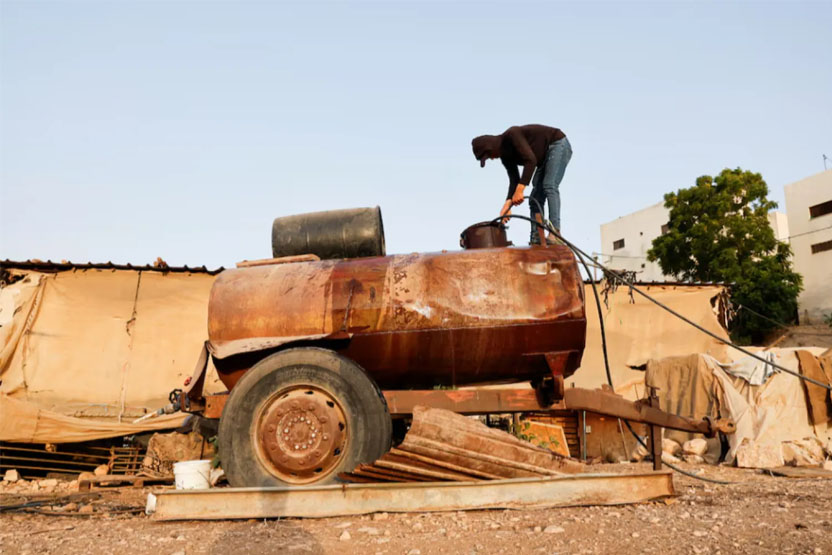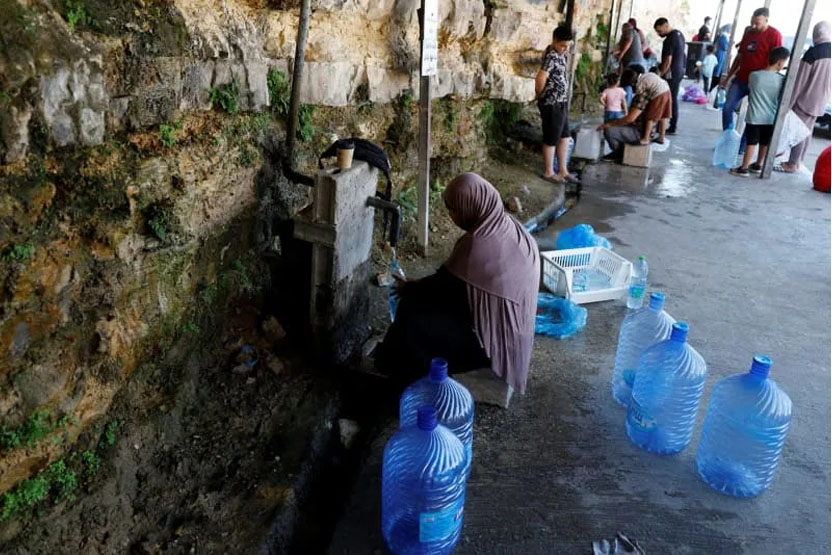
In the occupied West Bank, Palestinian residents are facing an unprecedented water shortage. Behind this crisis, they point to repeated attacks by Israeli settlers on the few water sources they still have.
In many towns, taps have run dry and farmland is left without irrigation. In Ramallah, the administrative capital of the Palestinian Authority, residents have no choice but to fill jerrycans at public water points. “We only have water at home two days a week. So everyone comes here,” explains Umm Ziad, holding an empty container.
A Palestinian woman fills water containers from a public water point, in Ramallah in the West Bank
Water Resources Under Attack
According to the United Nations, in just the first six months of this year, settlers carried out 62 acts of vandalism targeting wells, pipelines, distribution stations, and irrigation networks. Israeli forces acknowledge they have received multiple reports of deliberate destruction but claim no perpetrators have been identified.
Among the sites hit is the Ein Samiya spring, located about 15 kilometers northeast of Ramallah. It supplies some 20 Palestinian villages as well as several urban neighborhoods. For generations, locals came there to cool off in the summer. Now, the spring is under settler control, and Palestinians are denied access.
“Settler violence has reached dramatic levels,” says Abdullah Bairait, a 60-year-old resident of Kfar Malik, a nearby village surrounded by settlements. “They break into pumping stations, destroy the equipment, rip out the cameras, and cut off the water for hours.”
UN reports confirm similar attacks between June and July in the regions of Ramallah, Salfit, and Nablus, with natural springs being the main targets.
A Tool of Domination
Human rights groups stress that the West Bank’s water crisis is not just the result of vandalism, but of a deliberate policy of control. In an April 2023 report, the Israeli NGO B’Tselem wrote: “The water shortage in the West Bank is the direct outcome of Israel’s discriminatory policy, which uses water as a tool of control over Palestinians.”
While settlements enjoy abundant supplies, Palestinians live under strict quotas, rely on costly water trucks, and are forced to store rainwater in tanks. This structural inequality is compounded by Israel’s systematic refusal to approve any expansion or modernization of Palestinian water infrastructure.
Settler Violence and the Goal of Expulsion
Settler violence, a long-standing issue, has intensified since Hamas’s October 7, 2023 attack. The UN recorded more than 900 violent settler incidents against Palestinians in the first seven months of this year alone—an increase of 16 percent compared with last year.
For Palestinians, the campaign aims to gradually push them off their land. “If the attacks on water continue, we will have a water war,” warns Wafeeq Saleem, met at a public water point near Ramallah. “Water is the most essential thing for us.”
The water issue is inseparable from the territorial conflict. Since the 1967 occupation, Israel has imposed tight control over natural resources, especially the mountain aquifer that runs through the West Bank. Today, several Israeli politicians openly call for the outright annexation of the territory, even as the international community continues to regard settlements as illegal under international law.
For Palestinians, the battle over water is one of the clearest symbols of the occupation: their dried-up springs, destroyed wells, and sabotaged pumping stations embody a strategy that combines land seizure with the dismantling of livelihoods.



Comment